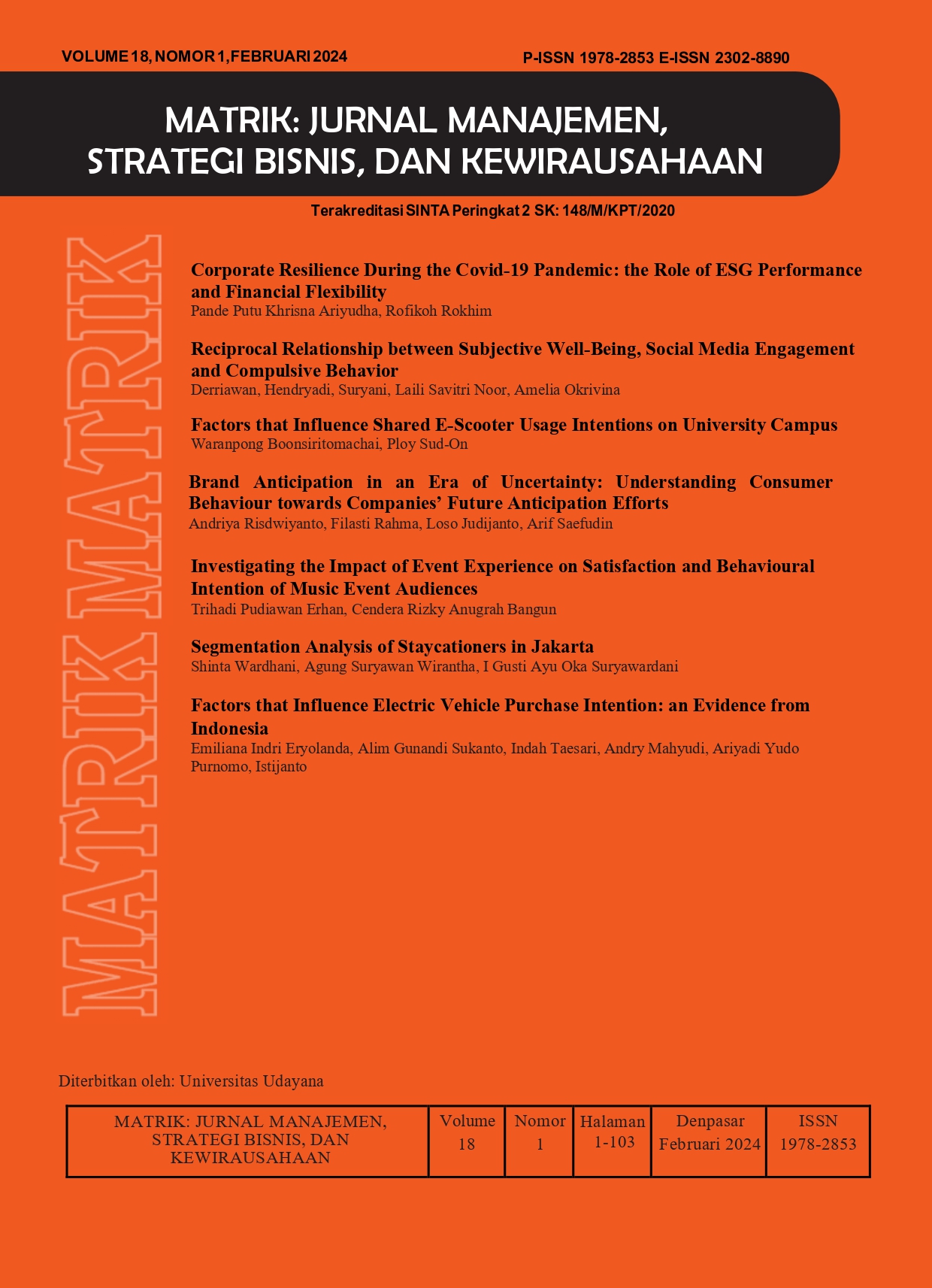Factors that Influence Shared E-Scooter Usage Intentions on University Campus
Abstract
In response to increasing environmental awareness, universities have introduced shared e-scooters for staff and students. However, usage remains low, indicating a disparity. This study investigates factors influencing Kasetsart University (Bangkok, Thailand) students' intentions to use shared e-scooters. A Likert-scale survey gathered data from 424 qualified respondents, and multiple regression analysis identified six factors: social norms, environmental concerns, infrastructure quality, perceived convenience, safety concerns, and cost. Environmental concerns and cost had no significant impact on students' intentions to use e-scooters. This study helps stakeholders, including the student council, e-scooter suppliers, and university administration, understand student demands and formulate suitable policies for on-campus mobility. Boosting e-scooter adoption can also justify the university's investment. However, the study is limited by its exclusive focus on student perspectives. Future research should integrate qualitative methods alongside quantitative approaches for a comprehensive understanding and better policy and service development for e-scooter adoption.
Keyword: intention to use; shared e-scooter; theory of planned behavior
Downloads
References
Albayati, H., Alistarbadi, N., & Rho, J. J. (2023). Assessing engagement decisions in NFT Metaverse based on the Theory of Planned Behavior (TPB). Telematics and Informatics Reports, 10(100045), 1-14.
Almannaa, M. H., Alsahhaf, F. A., Ashqar, H. I., Elhenawy, M., Masoud, M., & Rakotonirainy, A. (2021). Perception analysis of E-scooter riders and non-riders in Riyadh, Saudi Arabia: Survey outputs. Sustainability, 13(863), 1-24.
Bieliński, T., & Ważna, A. (2020). Electric scooter sharing and bike sharing user behaviour and characteristics. Sustainability, 12(22), 1-13.
Chen, C.-F., Eccarius, T., & Su, P.-C. (2021). The role of environmental concern in forming intentions for switching to electric scooters. Transportation Research Part A: Policy and Practice, 154, 129-144.
Chumpawadee, U., Homchampa, P., Thongkrajai, P., Suwanimitr, A., & Chadbunchachai, W. (2015). Factors related to motorcycle accident risk behavior among university students in northeastern Thailand. Southeast Asian J Trop Med Public Health, 46(4), 805-821.
Cohen, J. (1962). The statistical power of abnormal-social psychological research: a review. The Journal of Abnormal and Social Psychology, 65(3), 144-176.
Eccarius, T., & Lu, C.-C. (2020). Adoption intentions for micro-mobility–Insights from electric scooter sharing in Taiwan. Transportation research part D: transport and environment, 84(102327), 1-18.
Guo, Y., & Zhang, Y. (2021). Understanding factors influencing shared e-scooter usage and its impact on auto mode substitution. Transportation research part D: transport and environment, 99(102991), 1-13.
Halvadia, N. B., Bhatt, K., Sharma, M., Sharma, A., & Dash, S. (2022). Consumers’ intention to use bicycle-sharing services: The role of consumer consciousness. Cleaner and Responsible Consumption, 7(100076), 1-7.
Hull, A., & O’holleran, C. (2014). Bicycle infrastructure: can good design encourage cycling? Urban, Planning and Transport Research, 2(1), 369-406.
James, O., Swiderski, J., Hicks, J., Teoman, D., & Buehler, R. (2019). Pedestrians and e-scooters: An initial look at e-scooter parking and perceptions by riders and non-riders. Sustainability, 11(20), 5591.
Kazemzadeh, K., Haghani, M., & Sprei, F. (2023). Electric scooter safety: An integrative review of evidence from transport and medical research domains. Sustainable Cities and Society, 89(104313), 1-11.
Kellstedt, D. K., Spengler, J. O., & Maddock, J. E. (2021). Comparing Perceived and Objective Measures of Bikeability on a University Campus: A Case Study. Sage Open, 11(2), 1-10.
Leeuw, A., Valois, P., & Houssemand, C. (2011). Predicting the intentions to buy fair-trade products: The role of attitude, social norm, perceived behavioral control, and moral norm. OIDA International Journal of Sustainable Development, 2(10), 77-84.
Limphaiboon, C., Suphachan, S., & Ruttanatheerawichien, K. (2022). Factors affecting the development to become a green university of Thai private universities. KKBS Journal of Business Administration and Accountancy, 6(1), 34-47.
Ma, Q., Yang, H., Mayhue, A., Sun, Y., Huang, Z., & Ma, Y. (2021). E-Scooter safety: The riding risk analysis based on mobile sensing data. Accident Analysis & Prevention, 151(105954), 1-22.
Nunnally, J. C. (1978). Psychometric theory. McGraw-Hill.
Paireepinas, P., & Dhiravisit, A. (2020). Educational Inequality: A Study of the Urban Poor in Thailand. International Journal of Interdisciplinary Educational Studies, 15(1), 1-11.
Puratmaja, Y., Handayani, L., & Sunardi, K. S. (2017). Factors Associated with Motorcycle Risk Behavior in Thai University Students, Khon Kaen. International Journal of Evaluation and Research in Education, 6(4), 270-276.
Sanders, R. L., Branion-Calles, M., & Nelson, T. A. (2020). To scoot or not to scoot: Findings from a recent survey about the benefits and barriers of using E-scooters for riders and non-riders. Transportation Research Part A: Policy and Practice, 139, 217-227.
Tsou, H., Chen, J., Chou, C. Y., & Chen, T. (2019). Sharing economy service experience and its effects on behavioral intention. Sustainability, 11(18), 5050.
Tuli, F. M., Mitra, S., & Crews, M. B. (2021). Factors influencing the usage of shared E-scooters in Chicago. Transportation Research Part A: Policy and Practice, 154, 164-185.
United Nations. (2017). Global indicator framework for the Sustainable Development Goals and targets of the 2030 Agenda for Sustainable Development. Retrieved 17 January 2024 from https://unstats.un.org/sdgs/indicators/Global%20Indicator%20Framework%20after%202021%20refinement_Eng.pdf
Yuriev, A., Dahmen, M., Paillé, P., Boiral, O., & Guillaumie, L. (2020). Pro-environmental behaviors through the lens of the theory of planned behavior: A scoping review. Resources, Conservation and Recycling, 155(104660), 1-16.
Zhang, D., Schmöcker, J.-D., Fujii, S., & Yang, X. (2016). Social norms and public transport usage: empirical study from Shanghai. Transportation, 43, 869-888.
Zuniga-Garcia, N., Juri, N. R., Perrine, K. A., & Machemehl, R. B. (2021). E-scooters in urban infrastructure: Understanding sidewalk, bike lane, and roadway usage from trajectory data. Case studies on transport policy, 9(3), 983-994.
 This work is licensed under a Creative Commons Attribution-ShareAlike 4.0 International License.
This work is licensed under a Creative Commons Attribution-ShareAlike 4.0 International License.

















